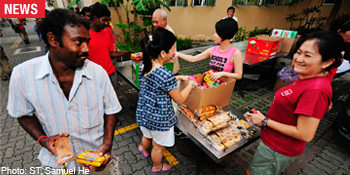http://www.asiaone.com/News/Mailbox/Story/A1Story20090724-156804.html
Fri, Jul 24, 2009
my paper

Do more to integrate foreigners
AS MANY as one million foreigners have come to Singapore's shores, with about 30,000 becoming new citizens each year.
However, nothing concrete is being done to help them integrate with the local community, even though they make their presence felt through the size of their numbers and economic contributions.
Furthermore, the foreigners bring with them their own religious and cultural values, which may antagonise many Singaporeans.
I never managed to get to know a foreigner in Singapore due to the lack of opportunities to interact with them.
However, I could readily sense their presence as they drove the buses that I travelled on and served the food that I ate daily.
But such contact was limited and superficial at best.
Here in Australia, where I have relocated, emigrants tend to congregate in certain areas.
There is not much integration and, in fact, many Chinese migrants still cannot speak English despite having lived in Australia for many years.
The lack of integration here contributed to the recent outbreaks of violence between Australians and Indians.
More can be done in Australia to help new migrants integrate with their adopted community.
Left to their own devices, migrants will feel as though they are second-class citizens in a foreign country.
Moreover, new migrants always find it tough to get employment because of the natural dislike of working with foreigners.
However, at a church that I attend here, white Australians and Asians mix regularly and often go out for lunches after services.
Integration will naturally take place when we come together regularly to interact.
Such activities offer a tingling welcome message that would warm a new migrant's heart.
Therefore, I urge for more programmes in Singapore to speed up the integration process.
Even though we have not experienced ugly ethnic clashes like those in Xinjiang, activities to promote social integration will surely help to prevent such violence from taking place.
Mr Gilbert Goh Keow Wah
Fri, Jul 24, 2009
my paper

Do more to integrate foreigners
AS MANY as one million foreigners have come to Singapore's shores, with about 30,000 becoming new citizens each year.
However, nothing concrete is being done to help them integrate with the local community, even though they make their presence felt through the size of their numbers and economic contributions.
Furthermore, the foreigners bring with them their own religious and cultural values, which may antagonise many Singaporeans.
I never managed to get to know a foreigner in Singapore due to the lack of opportunities to interact with them.
However, I could readily sense their presence as they drove the buses that I travelled on and served the food that I ate daily.
But such contact was limited and superficial at best.
Here in Australia, where I have relocated, emigrants tend to congregate in certain areas.
There is not much integration and, in fact, many Chinese migrants still cannot speak English despite having lived in Australia for many years.
The lack of integration here contributed to the recent outbreaks of violence between Australians and Indians.
More can be done in Australia to help new migrants integrate with their adopted community.
Left to their own devices, migrants will feel as though they are second-class citizens in a foreign country.
Moreover, new migrants always find it tough to get employment because of the natural dislike of working with foreigners.
However, at a church that I attend here, white Australians and Asians mix regularly and often go out for lunches after services.
Integration will naturally take place when we come together regularly to interact.
Such activities offer a tingling welcome message that would warm a new migrant's heart.
Therefore, I urge for more programmes in Singapore to speed up the integration process.
Even though we have not experienced ugly ethnic clashes like those in Xinjiang, activities to promote social integration will surely help to prevent such violence from taking place.
Mr Gilbert Goh Keow Wah
